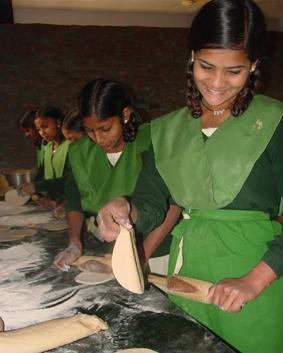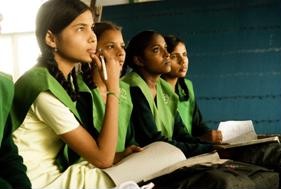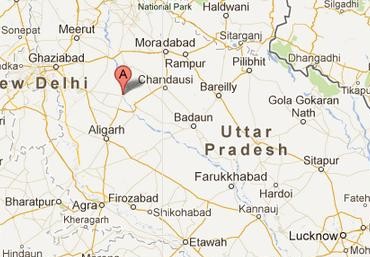Pardada Pardadi Educational Society (PPES) is an organization that is committed to helping girls in rural India. The organization has created a school called the Pardada Pardadi Girls Vocational School which is a registered school in the state of Uttar Pradesh, India. Specifically, it’s located in the village of Anupshahar in the Bulandshahr district of Uttar Pradesh, one of the least-educated and least-literate sections of India. It is also one of India’s poorest and highest crime rate areas. PPES was founded in 2000 by Virender Singh and began with the aim of women empowerment. It now strives to improve the living standards of these girls through the use of academics, vocations, and health education. Starting with only 45 girls, it’s now a growing institution with 1100 girls, first generations from their communities.
The Pardada Pardadi Girls Vocational School (PPGVS) was established to achieve social and economic empowerment and independence in their students. PPES provides the girls with free education from grade school to high school. In addition, they provide uniforms, 3 meals a day, and bicycles for girls. The girls get paid ten rupees a day and in total they will earn 30000 rupees (approximately $670), vocational skills, and a second-degree education. In addition, PPES guarantees jobs for girls after they graduate. PPGVS has two components: academics and vocational work. PPES has a program titled “Rags to Pads,” which provides the girls with sanitary pads and hygiene products.
Each year, REAL provides an annual grant of over $4,000 and to date, REAL has provided a total of $37,000 in grants to this program.
During the COVID-19 pandemic, PPES started having online classes over WhatsApp and Zoom for their students. Some of the girls didn’t have access to electronic devices as their parents took their cell phones to work, so PPES had to take some classes offline. The teachers personally delivered notes and homework for the students to complete and continue learning!
–Archana Venigalla
Please see below to dive deeper into the PPES program!
10 Rupee Effort
Students do not have to pay anything for uniforms, books, stationary, meals, or transportation; in fact they are given money to come to school. Each day she attends, a student receives ten rupees that is put into an account. The school is in possession of the money until the girl is 21 or when she is married, whichever comes first. By the time the student graduates high school, she should have approximately 30,000 rupees (~$545 USD) under her name, which often makes her one of the wealthiest in her village. If she wishes to continue her education, PPES pays for everything.
Education and Vocation
The PPGVS has two components: academics and vocational work. Students learn Hindi, English, social sciences, math, and other core subject areas. Additionally, they learn how to do hand embroidery and use sewing machines. The products they make are sold by PPES, and all sales go directly back into the school. The vocational training the girls acquire through school lead to their future economic stability. After students graduate, they are all given the opportunity to be employed by PPES, if they wish.
Hygiene Programs
PPES initiated a program titled “Rags to Pads.” Graduates of the school make sanitary pads for the girls at PPGVS and women in the surrounding villages. The girls learn of a healthier lifestyle through this program, and it keeps them from using dirty rags, which often leads to health problems. PPES also has some of the graduates from PPGVS building toilets throughout the city. These toilets are for the use of the graduates of the school, to encourage the continuation of the healthy lifestyle taught at PPGVS. By maintaining the use of sanitary necessities, girls can teach their families proper hygiene.
History
The Pardada Pardadi Educational Society (PPES) was founded in 2000 by Virender Singh. With only 45 girls to start, PPES began with the aim of women empowerment, and now strives to improve the living standard of the girls through academics, vocations, and health education. It is now a growing institution with 1100 girls, who are the first generation of students from their communities.
The Region
PPES is based in Anupshahr, a village in the Bulandshahr district of Uttar Pradesh, India. The area surrounding the school is one of India’s poorest. It is infamous for being crime-ridden and being one of the least educated, least literate populations. Over 85% of girls do not have access to primary education. Girls in Uttar Pradesh represent only 30% of the overall student population, as 88% of girls in the state stay home performing household duties. Girls are seen as poor resources of the family. Bulandshahr has a literacy rate of 59%. Only 34% of women in the district are literate. Only 6% of girls enrolled in the primary levels graduate from high school. Most of the girls who come to PPGVS are not considered family members, and are seen as a burden to society.
Site Visit Blog
By Anika Raghuvanshi
Pardada Pardadi Educational Society is an all girls school located in a small village in Northern India. It provides both education and vocational training for girls from very poor families. The girls in these villages marry around age 13, so their families do not see the benefit of education. Thus these girls are trapped in a cycle of poverty. When poor fathers are asked how many kids they have, they only count the boys.
Classrooms at PPES do not contain furniture, the exception being the computer room. When we walked into a classroom, the whole class would stand up to welcome us, and this along with interacting with the students showed that the girls are very cheerful, welcoming and excited about learning. Most can speak English well.
The school provides all meals. Two students from each class are assigned volunteers for the day to cook, serve, or clean depending on their age. The lunchtime scene is worth watching. It is very well organized affair. They set out the plates in such a way so that when the girls pick up their plates and sit, they exactly occupy every available space.
Every girl gets a transport provided by school. Girls who live nearby get the bikes while girls from far can ride the school bus. Kids do not have shower facilities at home, so they are provided shower facilities and soap/shampoo at school. All kids have a ‘shower period’ once a day. They are provided individual shower clothes by the school. On my visit, I got to go into the shower with the kids.
The site visit was performed by Anika and Arushi Raghuvanshi during the summer of 2011.
Instructor Testimonial
Teacher Name: Krishan Kumar Sharma
“When I joined PPES four years ago I thought that I am only joining an ordinary school, where my role is just to teach science to the students. But today I feel so proud to be part of PPES family because I am part of a big movement for social change and providing academic education is just a small part of my work” I am head of education department I can say that support from REAL will help these rural girls to achieve their goals in life leading to development of rural India.”
REAL’s Contribution
Each year, REAL provides an annual grant of over $4,000 and to date, REAL has provided a total of $37,000 in grants to this program.





